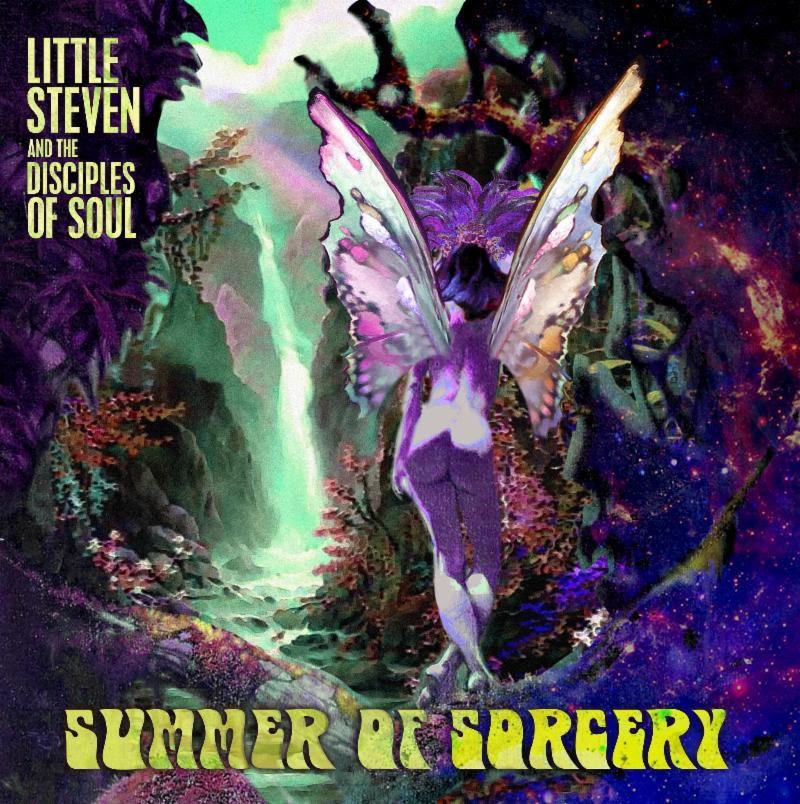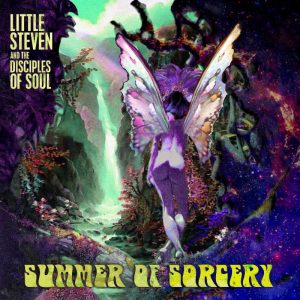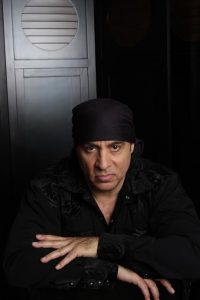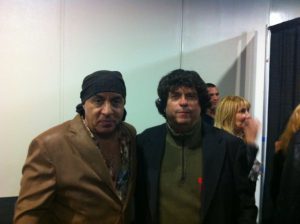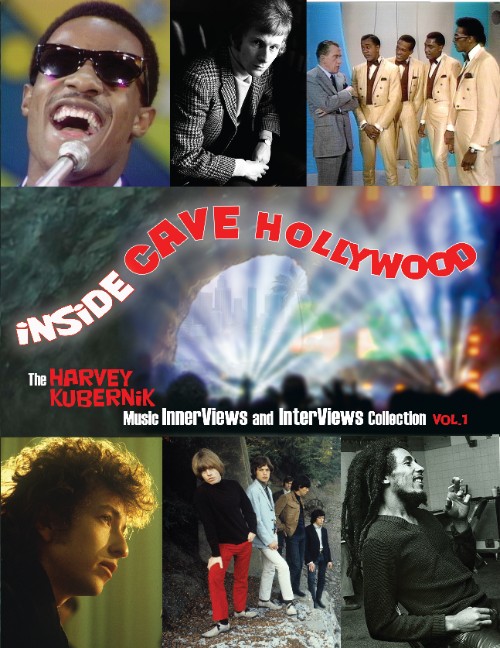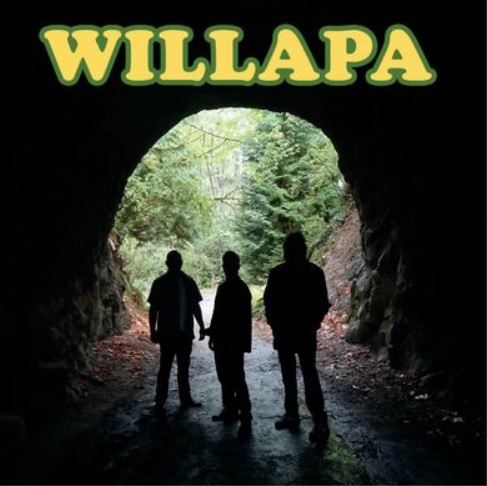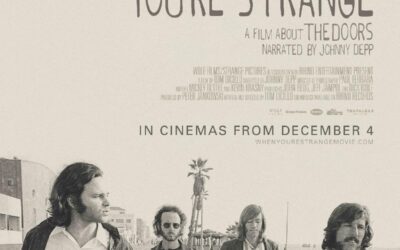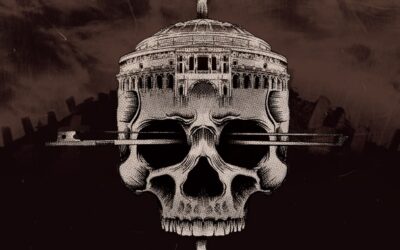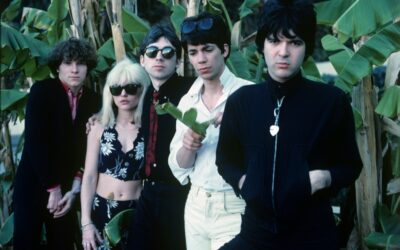FIRST ALBUM OF NEW MATERIAL SUMMER OF SORCERY IN 20 YEARS VIA WICKED COOL/UME Label;
BY HARVEY KUBERNIK © 2019
Little Steven and the Disciples of Soul’s Summer Of Sorcery was just released during May on CD, digitally and on vinyl as double LP on 180-
gram black vinyl via Wicked Cool/UMe label.
A wide-ranging world tour began May 16 at Liverpool, UK’s 02 Academy and then made stops across the United Kingdom, Germany, Denmark, Sweden, Norway, Belgium, the Netherlands, Switzerland, Italy and Spain.
The first leg of the North American tour started July 2 at the London Music Hall in Ontario, Canada and take Van Zandt and band all across Canada and the Eastern U.S., culminating at Outlaw Jam in Annapolis, Md.
They will return to Europe in August for more shows and return to the US in September for the second leg of the tour that will culminate at New York City’s Beacon Theatre on November 6th.
Each show on the American tour will benefit Van Zandt’s TeachRock education initiative and offer an introduction to the Teachrock.org curriculum. Before the show, the TeachRock staff will host free professional development workshops designed to engage educators with techniques and content through which they can comfortably use music to inspire students, even if they’ve never touched an instrument.
The free, multimedia K-12 interdisciplinary curriculum meets prevailing standards in English Language Arts, Social Studies/History, the Fine and Performing Arts, and also includes STEAM and advisory material suitable for K-12 teachers of all disciplines, interdisciplinary best practices and group activities.
Summer Of Sorcery – which arrives just two years after Little Steven’s acclaimed 2017’s solo return, Soulfire, and its 2018 live follow-up, Soulfire Live! – was written, arranged, and produced by Van Zandt at his own Renegade Studios in New York City; the album was co-produced and recorded by Geoff Sanoff and co-produced by Disciples of Soul musical director and guitarist Marc Ribler.
Summer Of Sorcery was mixed and mastered respectively by Van Zandt’s career-long collaborators and friends Bob Clearmountain and Bob Ludwig (. The album – which features an exclusive introduction written by Van Zandt – is adorned with Frank Frazetta-inspired cover art by Steven’s longtime art director, Louis Arzonico.
“I know it sounds a bit silly but I do believe Rock ‘n’ Roll can change the world,” Van Zandt volunteered. “It’s about bands, and that for me suggests brotherhood, family, friendship, and community”
In addition to his ongoing role as a touring and recording member of The E Street Band, the past two decades have seen the Rock and Roll Hall of Famer expand his personal parameters to include legendary work as an actor on The Sopranos and Lilyhammer as well as host-creator of Sirius XM’s one-and-only Little Steven’s Underground Garage creator of Sirius XM’s long-running Outlaw Country format).
In 2016 Van Zandt narrated Bang! The Bert Berns Story and the following year he was on screen in Rumble: The Indians Who Rocked the World.
“Quite honestly, the Soulfire Tour was something special,” reflects Van Zandt. “It was a definitive type of tour – I told my whole life story and most of the story of the history of rock ‘n’ roll simultaneously, it was a show 20, 30, 40 years in the making. So it was like, ok, now what? How do we beat that, or at least equal it? You set these standards and now you’ve got to reach them.”
During 2017, Little Steven and the Disciples of Soul issued Soul Fire Live! on Van Zandt’s Wicked Cool/UMe Records. The multi-disc endeavor spotlights a stellar version of the Electric Flag’s “Groovin’ Is Easy.”
Van Zandt’s myriad creative efforts in recent years include composing the score for all three seasons of Lilyhammer along with landmark work as producer and songwriter, lending his distinctive craft to records including Darlene Love’s acclaimed 2015 release, Introducing Darlene Love.
For the first time, the music from Lilyhammer, Netflix’s first original series, which ended in 2014, has been collected together and will be released as two separate albums under the moniker Little Steven and the Interstellar Jazz Renegades: Lilyhammer The Score – Volume 1: Jazz and Volume 2: Folk, Rock, Rio, Bits And Pieces – on CD, digital and 180-gram black vinyl on July 12 via Wicked Cool/UMe.
When Van Zandt was tasked with coming up with the music to soundtrack Lilyhammer, the veteran musician, songwriter and producer who had pretty much done it all in the worlds of songwriting, including dozens of albums, hundreds of songs, tracks for movies, a Broadway musical, as well as music supervision and musical direction, had never scored a television show and was up to the challenge.
Knowing he wanted to create something that combined New York jazz to represent his character Frank “The Fixer” Tagliano with the Norwegian folk music of his exotic new environs, he turned to friend and fellow E Street Band member Max Weinberg for some advice on who could help him put a band together that could flawlessly execute these two disparate genres.
On Weinberg’s recommendation, he enlisted pianist, arranger and orchestrator, Lee Musiker, known for his wealth of experience working with premiere artists in the jazz, classical, Broadway, and pop genres, such as Mel Tormé, Kristin Chenoweth, Wynton Marsalis, Buddy Rich and Tony Bennett, to help bring his vision to life. Together they assembled the Interstellar Jazz Renegades, a loose collective of NYC’s finest musicians, led by Musiker and orchestrators Raul Agraz, Adam Hochstatter and longtime Asbury Juke/Disciple of Soul saxophonist Stan Harrison.
“I figured I’ve got some of the most talented musicians in New York City so why waste them on 15 second cues,” Van Zandt explains. “We decided to have some fun. I’d meet Lee about an hour before the session and give him the top line melodies, basic chord changes and structure and talk about the overall mood of the piece. I wanted to try something different and get the musicians creative input and let these guys who were used to always reading their parts express themselves for a change.
“We would basically arrange it on the spot. I’d suggest a harmony Lee would suggest an idea and the musicians would begin to orchestrate themselves. It was wild and extremely fruitful. After the success of the first session I knew we had a legitimate jazz album in addition to an incredible score.”
The music of Lilyhammer was arranged and produced by Van Zandt and recorded at his Renegade Studios in New York and at various studios in Norway while in the midst of filming. It was recorded, mixed and co-produced by Geoff Sanoff and mastered by Bob Ludwig at Gateway Mastering.
In the Wicked Cool/UMe label publicity release for Summer of Sorcery Van Zandt offered, “My first five albums in the ‘80s were both very personal, and very political. I wanted the new material to be more fictionalized. The way records were when I grew up, before it was an art form.
“The concept was capturing and communicating that first rush of summer. The electricity of that feeling of unlimited possibilities. Of falling in love with the world for the first time. Obviously, there are occasional personal references, and a bit of what’s going on socially scattered throughout, but I achieved what I set out to do. I created a collection of fictional movies scenes that feel like summer. I’m quite proud of it.”
Little Steven is joined on this musical journey with his all-star band the Disciples of Soul, a 14-strong ensemble made up of some of the best studio and live musicians in the business.
Summer Of Sorcery is another landmark work in a four-decade career full of milestones, a spirited collection of songs which conjure up all the wonder and magic of the eponymous season – the beach and the boardwalk, the young love and unbridled lust, the innocence and experience that somehow starts it all.
“I always work thematically,” Van Zandt says. “I can’t just throw together a collection of songs; there has to be some kind of overriding idea that drives it. This time I wanted to capture the excitement of that first summer of consciousness. That one special summer where you first fall in love with life, that thrill of just being alive.”
The Wicked Cool/UMe publicity materials further describes Steven’s new collection.
“The album features 10 original new songs alongside “Suddenly You,” an outtake from the Lilyhammer score, Netflix’s first original series,
which starred Van Zandt who also composed all the music for trailblazing show, and a reimagining of “Education” which was first recorded for his 1989 album Revolution.
“The education system needs to be fixed, needs to be improved,” he stresses. “Teachers need to be supported. There needs to be more support, more funding. That’s what I’m trying to get across with my TeachRock program and that’s all in this song.
“The record culminates with the epic title track, “Summer of Sorcery,” an eight-minute mission statement that conjures the euphoric rush of a summer romance and limitless possibility. “The whole theme of the album is summed up in that song, that wizardry, that magic mixture of falling in love in the summer.
“I wanted to create a hybrid that would be uniquely me,” he says. “I wanted to hear Sly and the Family Stone, I wanted to hear Sam Cooke, I wanted to hear Tito Puente. I wanted to try and get the Beach Boys in there. James Brown, of course. I had certain touchstones of musical influence that I wanted to integrate into my thing.”
Recorded last year mid-Soulfire tour and then mixed whilst on the road once again, Summer Of Sorcery represents a straightforward progression from its predecessor, the first time in Van Zandt’s long career that he’s maintained a band line-up and sonic approach from one solo work to the next.
“Instead of embarking on a whole new adventure, I decided, I’m going to evolve this thing,” Van Zandt suggested in the Wicked Cool/Ume statement.
“I’ve always wondered where my sound would evolve to if I ever did the same thing twice, if I ever evolved vertically rather than horizontally. All five of my solo albums before Soulfire are completely different genres. I never had a chance to evolve one particular thing to see where it went.
“With this record I really wanted to travel back to a time when life was exciting, when unlimited possibilities were there every day,” reinforces Van Zandt.
“That was the feeling in the ‘60s, the thrill of the unexpected coming at you. Our minds were blown every single day, one amazing thing after another, constantly lifting you up. So you kind of walked around six inches off the ground all the time, there was something that kept you buoyant in your spirit. I wanted to try and capture that first and foremost.
“Making this record was everything I’d hoped for,” Little Steven says. “What I’d hoped would happen was, you put the whole tour, all of those songs, into a funnel and out of that funnel comes a new album. And that’s exactly what happened.”
Steven Van Zandt was born November 22, 1950 in Watertown, Mass and became a teenager the day John F. Kennedy was assassinated in Dallas, Texas. He hails from Middletown, New Jersey and was in a garage rock band, Source, when he first met Bruce Springsteen from nearby Freehold, New Jersey. Van Zandt now resides in New York City.
I have known Steven Van Zandt since 1975 when he first came to West Hollywood with Bruce Springsteen & the E Street Band to play an engagement at the Roxy Theatre. On that visit I invited Steven and Bruce to attend Dion recording session Phil Spector was producing at Gold Star studio.
We’ve always been in touch and have remained friends.
Earlier this century when he started his Little Steven Underground Garage channel with Sirius XM satellite radio I supplied the initial contact information for Kim Fowley, Andrew Loog Oldham and Rodney Bingenheimer all who eventually held deejay shifts on his landmark venture.
Steven Van Zandt has been an occasional contributor to my print and online articles over the last 44 years, including www.cavehollywood.com. I profiled him at length in my first book This Is Rebel Music The Harvey Kubernik InnerViews published in 2004.
Q: Your Underground Garage Channel with Sirius XM has developed internationally.
A: I have and affection for radio that I grew up on and can’t begin to repay. AM radio, which everyone tends to put down, let me tell you, that was a ball. I was interested, I came up with a format, and garage rock was a part of it. I want these DJ’s to feel they are communicating their personalities to the audience. That’s what I grew up with and that’s what I miss. It didn’t happen and they became all talk.
“I had to be a combination of things I loved or I wasn’t going to be able to sell this thing. It had to be something that really worked together. What happened next I was gonna play by ear. I knew I wanted it to be about the music, and not about me. OK? And I knew I was going to have to do it in a way that wasn’t an academic atmosphere.
“It had to be fun. Blocks of tunes and combine the different eras in the same set. And this is what is most important. The greatest thing that has happened to me is people coming up to me and emailing, ‘I’m not sure if that was an old song or a new song?’ I’m trying to show the connection between things and how they are connected and how they all strengthen each other and how there is a tradition that these new bands are continuing in. Let’s support them and maybe we can actually resurrect an art form.
“The real point I hope is not that this is something I’m being nostalgic about, but something that is very cool then and very cool now. You’re gonna get something out of this now just as I get something out of it now. I don’t hear a song and think ‘where was I when I first heard this?’
“The medium itself I think is the last truly magical medium that can’t be messed with. Movies are a magical medium, but we now have shows that explain to you why it’s not magic. Every other show special effects done, over exposing actors, so you don’t get the movie going experience.
“Let me tell you something. The best Small Faces stuff was on Andrew Loog Oldham’s Immediate Records and he is very much not only part
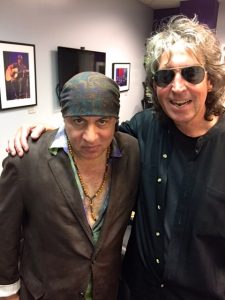
Little Steven Van Zandt and musician/DJ David Kessel of Cave Hollywood ( photo by Clem Burke). Courtesy David Kessel
of garage, he’s the father of garage. The Rolling Stones are the archetype, no matter what anybody says, they are the archetype garage band and he was very much instrumental in what they did, how they came across and what they sounded like and all of that.
“And Shel Talmy’s productions with the Who and the Kinks I play as well. I play all sorts Of things: The Yardbirds, 13th Floor Elevators, Monkees, the Standells, the Ramones, the Greenhornes, Pretty Things, the Datsuns, tracks from Rhino Records’ Nuggets box like Kim Fowley’s ‘The Trip’ and the Electric Prunes’ ‘I Had Too Much To Dream Last Night.’
Q: I’m happy to have made some playlist suggestions and steered you to a few friends who you hired as well introducing you to Gary Stewart at Rhino Records who oversaw the re-release of the Lenny Kaye assembled Nuggets box set.
A: It’s everything and everybody, that’s what is remarkable. I don’t mean to be blasphemes but I look at rock and roll as a religion. For me it is that kind of thing. People become part of this religion regardless of their age, or what a certain common ground with this type or that I can’t explain but I know exists.
“It doesn’t exist with other types of music but sort of essential. Through rock and roll thing I either accidently through life experience have stumbled into here, this combination of things I’m playing just seems to have some common ground with people that can not be explained from 15 to 55. They react to it exactly the same way. This is cool.
Q: You have always loved Bob Dylan and the Byrds.
A: Then when I heard ‘Like A Rolling Stone’ as a kid that was the first time he meant something to me. All of a sudden Wow! This was something different, new and interesting.
“I tuned in for Highway 61 Revisited and then Blonde On Blonde, which I think is the greatest record anyone ever heard.
“Bob Dylan is in heavy rotation in the Underground Garage, no question about it. I tend to play more Highway 61 Revisited than Blonde On Blonde, only because the songs are shorter. (laughs). That’s a factor with me. I will make exceptions for Bob. (laughs). Generally speaking, I like to keep songs short and keep them coming.
“Although the Byrds introducing him to the world, really, with ‘Mr. Tambourine Man’ was a major factor. I can’t give them enough credit for that. I don’t know if Bob Dylan would have been accepted at Top 40 radio if it hadn’t been for ‘Mr. Tambourine Man.’ I mean that. That gang has been a great service to the world. I was a huge Byrds’ freak. Still am. As you know they lead you to Bob.
“I play a lot of Highway 61 Revisited and Blonde On Blonde. We usually don’t play a lot of Bob’s things that classic rock stations are playing, like ‘Tangled Up In Blue.’ I’ve programmed Rod Stewart and the Faces covering ‘The Wicked Messenger’ from John Wesley Harding and Jimi Hendrix doing ‘All Along The Watchtower’ from the same album.
“Dylan pretty much walked away from rock ‘n’ roll for a minute, ya know, and started getting back to his roots and taking them to some other place. People didn’t know what to make of it at the time.
“It was a strange sort of new Bob Dylan that emerged after his July 1966 motorcycle accident. Jimi Hendrix did more to promote John Wesley Harding than anybody. It was one of the most remarkable records ever made of course. And the fact that Jimi picked up on that from this unusual and not very popular Bob Dylan album and made everybody go back to it. And, I’m telling you, that’s how powerful that record was.
“Everybody went back to John Wesley Harding after hearing Hendrix thinking, ‘you know, maybe I missed something? Look what Jimi Hendrix did with it. Look what the Faces did with it.’ It worked. It’s a terrific album but sort of subtle, compared to Blonde On Blonde that most people consider Bob’s peak.
Q: You program the Beatles and host a show exclusively devoted to them, spinning the Beatles on vinyl, in mono and stream them digitally.
A: There was something physical as well as audio that the analog medium communicated that digital never will.
“It doesn’t really matter of course unless you’re listening to it on vinyl anyway and we know whatever they used will be a relief compared to the various, sometimes absurd, and usually terrible stereo versions.
“I had probably five lengthy conversations with [Apple Records’] Neil Aspinall over the last ten years of his life. In every one I begged him to put out the original configurations in the original mono. At first he couldn’t quite understand why I was so passionate about it. By the third conversation he realized I was never going to stop bugging him about it and started seriously considering, not if, but when it could get done. He always had one distraction after the other, the Las Vegas thing [LOVE] took a lot of his time, but I’m sure he put it in motion before he left us. Anyway, I’m very very glad it got done.
“So now our masterpieces have been restored, and our leaders once again assume their proper place as our standard bearers. And peace returns to Pepperland.
Q: There is also your Outlaw Country channel.
A: Keep in mind, when it comes to Nashville, and the more country leaning things, I started an entire different format with Outlaw Country for these things.
“Specifically for Bob Dylan, who is in both formats, and selections from the Byrds, like their Sweetheart of the Rodeo. Underground Garage and Outlaw Country are also for the ‘Johnny Cashes’ of the world and all of the new country stuff that is out in addition to the earlier generations of Hank Williams.
“On my Outlaw Country channel I program things from producer Bob Johnston’s Cash albums all the time, especially the Live San Quentin.
“All the stuff that falls through the cracks of mainstream country we created a format, including country rock and country folk-influenced rock, because there is no format for groups like the Band. Where does the Band get played? Nowhere! Well, that’s a crime, man. That’s not right. OK?
Q: Has being a musician really impacted or informed your radio vision?
A: I’m not sure if being a musician helps, but being a street survivor certainly does help. And keep in mind we were street survivors before we were in the music business. We had to learn how to survive without the business for 10, 7 years. OK. The business was a pain in the ass to be frank. I took a huge pay cut when I left the Asbury Jukes and joined Bruce Springsteen and The E Street Band. I never made that much money again for five years, because I was playing in Asbury Park for three nights a week. OK.
“There’s an accessibility now as time goes on, it becomes really clear. What’s really amazing to me is how my own perception has on one level stayed exactly the same and on the other starting to see how the Beatles become more of a garage band every year and at the time, they were very sophisticated. Now, you listen back, what a cool garage band this was. You hear the mistakes. And you hear guys playing. And regardless of everything Ringo is playing those fuckin’ drums.
(Harvey Kubernik is an author of 15 books. His literary and music anthology Inside Cave Hollywood: The Harvey Kubernik Music InnerViews and InterViews Collection Vol. 1, was published in December 2017, by Cave Hollywood.
Kubernik’s The Doors Summer’s Gone was published by Other World Cottage Industries in February 2018 and has been nominated for the 2019 Association for Recorded Sound Collections Awards for Excellence in Historical Recorded Sound Research.
During December 2018, Sterling/Barnes and Noble published Kubernik’s The Story of The Band From Big Pink to the Last Waltz. This century Harvey penned the liner note booklets to the CD re-releases of Carole King’s Tapestry, Elvis Presley The ’68 Comeback Special, The Ramones’ End of the Century and Allen Ginsberg’s Kaddish.
Kubernik’s writings have been printed in book anthologies, including The Rolling Stone Book of the Beats and Drinking with Bukowski. He is the project coordinator of the recording set The Jack Kerouac Collection.
In November 2006, Harvey Kubernik was a featured speaker discussing audiotape preservation and archiving at special hearings called by The Library of Congress and held in Hollywood, California.
Kubernik’s 1995 interview, Berry Gordy: A Conversation With Mr. Motown, that initially was published in 1995 in Goldmine and HITS magazines will now be in The Pop, Rock & Soul Reader edited by David Brackett to be published in 2019 by Oxford University Press).

